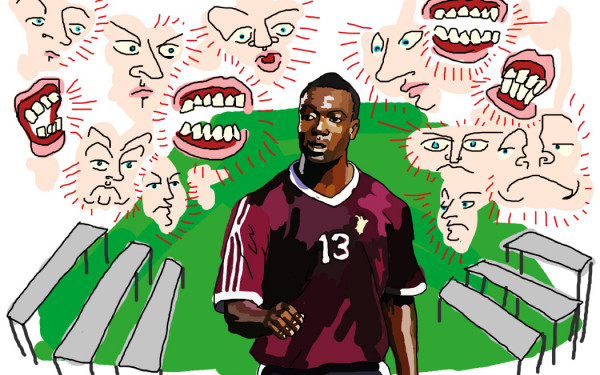Sport Transcending Borders
But How to Get People Interested in the Impact?
The European Football Championship is more than just an ordinary soccer tournament. It generates unity not only for the countries participating in the event, but also for local ethnic enclaves here in Montreal.
The Euro only comes around once every four years (like the World Cup, but offset by two years so as not to overlap), so the level of pandemonium in participating countries and those with ties to said countries is understandable. It’s the gold medal men’s hockey game mixed with the season finale of a Telemundo soap.
“The European Championship is a widely publicized international sporting event,” said Jessica Silva, assistant technical director at Club Soccer Longueuil. “There is this international fever that unites nationalities.”
The problem, at least in Montreal, is that this incredible football-fever seems to disappear the moment the Euro champs receive their trophy. Where is that same passion for the team residing in our own backyard, the Montreal Impact?
There’s no doubt a strong soccer community lives in this city, but for whatever reason, the seats in the stands at Saputo Stadium have yet to be filled to capacity like they should be, considering the hype that surrounded the long-awaited arrival of Major League Soccer in this city.
While the Euro transcends the sport, igniting passion and pride while uniting nationalities all over the world, the Impact have had trouble getting people to actually come out and watch the games.
Traffic in Montreal may be brutal, and the location is not ideal for those coming from the West Island and Downtown, but with the use of public transportation it isn’t all that difficult to get to Saputo Stadium in a respectable amount of time—not to mention the money saved on gas.
Silva believes the European Championship offers a platform from which “nationalities can be proud of their countries of origin,” a sentiment also expressed by Antonio Serpa, a Portuguese native who now resides in St-Hubert, 15 minutes east of Montreal.
“Winning breeds pride,” said Serpa. “It brings national pride.”
If winning is what breeds pride, and pride results in ticket sales, then the Impact need to start winning. Expectations were not high (and never are) for an expansion team, but winning always piques the interest of the average fan.
Mike Herriot, an avid soccer fan and Impact season-ticket holder, agreed with the notion that more wins would translate into bigger crowds.
“I was born in the UK, so soccer is my favourite sport. It’s exciting to have a pro team in town,” said Herriot. “It’s cool to have a local team to support.”
“It would be nice to see it full every night. It would be awesome to have sold-out crowds. This city loves winners. We need to win games more frequently and I think if this happens, more people will come out.”
Herriot also pointed to the fact that the addition of European soccer stars such as Italians Bernardo Corradi (from Udinese), Matteo Ferrari (Beşiktaş), Marco Di Vaio (Bologna), and most recently Swiss defender Dennis Iapichino (FC Basel) has gotten fans intrigued and excited about the on-field product.
There are others, however, who don’t share the same sentiments that Herriot does when it comes to the Impact.
“[The Impact] are not huge in Montreal. I don’t see them as a professional team,” said Kevin Milonja, who plays first division soccer in the Association régionale de soccer de la Rive-Sud.
“They basically play in a pickup league—[players] that will never make it far. A second division team in Europe can beat them. I’d just rather watch professionals play, that’s why I’d rather watch tournaments like the Euro.”
Another thing to consider is the substantial drop in attendance ever since the Impact played their first game at Saputo Stadium. Their first game in the stadium with a capacity of over 20,000 saw only 17,000 people show up to see them beat the Seattle Sounders. Since then they have seen crowds of 12,000 for a 4-2 drubbing of the Houston Dynamo and 14,000 in a 3-0 loss to Toronto FC.
One thing is certain: the European Championship offered much more than just sporting entertainment. It gave Montreal and its vast multiculturalism a reason to unite and cram around a television while their pride was on the line.
Now, it’s time for that emotional investment to be transferred over to the team we can all rally behind—the team that represents our city, our culture and our homes. It’s time to make an impact, Montreal.

_900_675_90.jpg)

1_600_375_90_s_c1.jpg)
_600_375_90_s_c1.jpg)
_600_375_90_s_c1.jpg)
